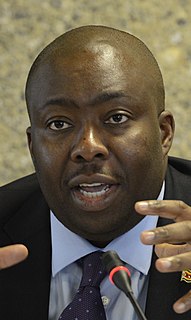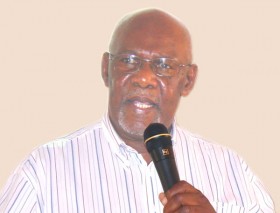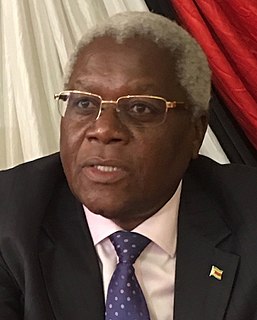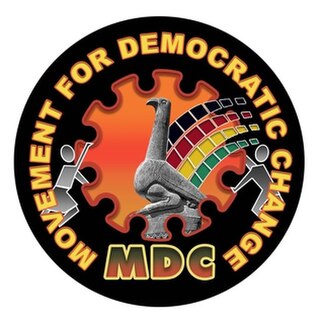Related Research Articles

The Zimbabwe African National Union – Patriotic Front (ZANU–PF) is a political organisation which has been the ruling party of Zimbabwe since independence in 1980. The party was led for many years under Robert Mugabe, first as prime minister with the Zimbabwe African National Union (ZANU) and then as president from 1987 after the merger with the Zimbabwe African People's Union (ZAPU) and retaining the name ZANU–PF, until 2017, when he was removed as leader.

Joice Runaida Mujuru, also known by her nom-de-guerre Teurai Ropa, is a Zimbabwean revolutionary and politician who served as Vice-President of Zimbabwe from 2004 to 2014. Previously she had served as a government minister. She also served as Vice-President of ZANU–PF. She was married to Solomon Mujuru until his death in 2011 and was long considered a potential successor to President Robert Mugabe, but in 2014 she was denounced for allegedly plotting against Mugabe. As a result of the accusations against her, Mujuru lost both her post as Vice-President and her position in the party leadership. She was expelled from the party a few months later, after which she formed the new Zimbabwe People First party.
Jonathan Nathaniel Mlevu Moyo is a Zimbabwean politician who served in the government of Zimbabwe as Minister of Higher Education from 2015 to 2017. He was previously Minister of Information and Publicity from 2000 to 2005 and again from 2013 to 2015. He was elected to the House of Assembly of Zimbabwe as an independent candidate in 2005 and 2008. He is considered the core architect of the AIPPA and POSA restrictive legislation.

Saviour Kasukuwere is a Zimbabwean politician who served in the government of Zimbabwe as Minister of Local Government, Rural Development and National Housing between October and November 2017. He was also the ZANU–PF party's national political commissar until December 2017. Before that he was Minister of Youth Development, Indigenisation and Empowerment, and Minister of the Environment, Water and Climate. In October 2020, the Zimbabwe government sought Kasukuwere's extradition after issuing a warrant for his arrest. It was revealed that Kasukuwere was among loyalists of former President Robert Mugabe who fled to South Africa before their criminal trials could be completed.
Border Gezi was a Zimbabwean politician. He was a close ally of Robert Mugabe within ZANU-PF and served as Minister for Gender, Youth and Employment from 2000 having previously been a provincial governor.

Dumiso Dabengwa was a Zimbabwean politician. He served as the head of Zimbabwe People's Revolutionary Army (ZIPRA) intelligence during the Rhodesian Bush War.
Sydney Tigere Sekeramayi is a Zimbabwean politician who served in the government of Zimbabwe as Minister of Defence between 2013 and 2017. He has been a minister in the Cabinet since independence in 1980, serving as Minister of Defence from 2001 to 2009 and Minister of State Security from 2009 to 2013.
Christopher Chindoti Mushohwe is a Zimbabwean politician.
Patrick Antony Chinamasa is a Zimbabwean politician who served in the government of Zimbabwe as the minister of various cabinet ministries. Previously he served as the Minister of Finance and Investment Promotion and the Minister of Justice, Legal and Parliamentary Affairs.
Nicholas Tasunungurwa Goche is the former Minister of Transport. Previously he was Minister of Public Service, Labour and Social Welfare. Minister of Transport and Infrastructure Development. He served during the tenure of Robert Mugabe who replaced him in 2014 with Prisca Mupfumira after he was accused of trying to kill the President as part of a coup.
Munyaradzi Paul Mangwana is a Zimbabwean politician, who has previously served in the cabinet of Zimbabwe.
Simbarashe Herbert Stanley Makoni is a Zimbabwean politician and was a candidate for the March 2008 presidential election against incumbent Robert Mugabe. He was Minister of Finance and Economic Development in President Robert Mugabe's cabinet from 2000 to 2002. He faced strong opposition during the Economic Change in Zimbabwe in the early 2000s as his policies contradicted those of the rest of the ZANU-PF party.
Amos Bernard Muvengwa Midzi was a Zimbabwean politician who served in the Cabinet successively as Minister of Energy and Power Development and Minister of Mines and Mining Development from 2002 to 2009.
Obert Moses Mpofu is a Zimbabwean politician, who served as Minister of Home Affairs from 2017 to September 2018. Previously he was Minister of Macro-Economic Planning and Investment Promotion; Minister of Industry and International Trade; Minister of Mines and Mining Development; and Minister of Transport and Infrastructure Development. The Cabinet of Zimbabwe was later dissolved on 27 November 2017. He was reappointed as Minister of Home Affairs in Mnangagwa's first cabinet on 30 November 2017. The Culture portfolio was added to his ministry. Mpofu was later removed from the Zimbabwe cabinet in September 2018.

Ignatius Morgen Chiminya Chombo is a Zimbabwean politician who was Finance Minister of Zimbabwe in 2017. Previously he has served in the Cabinet of Zimbabwe as Minister of Home Affairs from 2015–17, Minister of Local Government, Public Works and Urban Development from 2000–2015.
Webster Kotiwani Shamu is a Zimbabwean politician and former Minister of Mashonaland West Provincial Affairs fired by President Emmerson Mnangagwa on 21 May 2018. He previously served as Minister of Information and Publicity, and Minister of State for Policy Implementation. He is a member of parliament representing the Chegutu constituency. The Cabinet of Zimbabwe was later dissolved on 27 November 2017.

The Movement for Democratic Change – Tsvangirai (MDC–T) is a centre-left political party and was the main opposition party in the House of Assembly of Zimbabwe ahead of the 2018 elections. After the split of the original Movement for Democratic Change in 2005, the MDC–T remained the major opposition faction, while a smaller faction, the Movement for Democratic Change – Ncube, or MDC–N, was led by Welshman Ncube.
Tracy Mutinhiri is the Zimbabwe Deputy Minister of Labour and Social Welfare. She is the Member of House of Assembly for Marondera East (ZANU-PF).

General elections were held in Zimbabwe on 29 March 2008 to elect the President and Parliament. Because of Zimbabwe's dire economic situation, the elections were expected to provide incumbent President Robert Mugabe with his toughest electoral challenge to date. Mugabe's opponents were critical of the handling of the electoral process, and the government was accused of planning to rig the election. Human Rights Watch said that the election was likely to be "deeply flawed."
The National Patriotic Front (NPF) is a Zimbabwean political party founded on 19 November 2017 by leaders of the expelled G40 faction of the ZANU-PF party, which included the exiled Jonathan Moyo, Patrick Zhuwao and Saviour Kasukuwere.
References
- ↑ "Mugabe rewards loyalists in new Cabinet", New Zimbabwe (zimbabwesituation.com), February 9, 2004.
- ↑ "Zimbabwe: Zanu-PF Names Poll Candidates", The Herald (allAfrica.com), February 15, 2008.
- ↑ Election results Archived 2008-04-09 at the Wayback Machine at newzimbabwe.com.
- ↑ Issuance of new Zimbabwe Executive Order; Zimbabwe designations and designations updates.